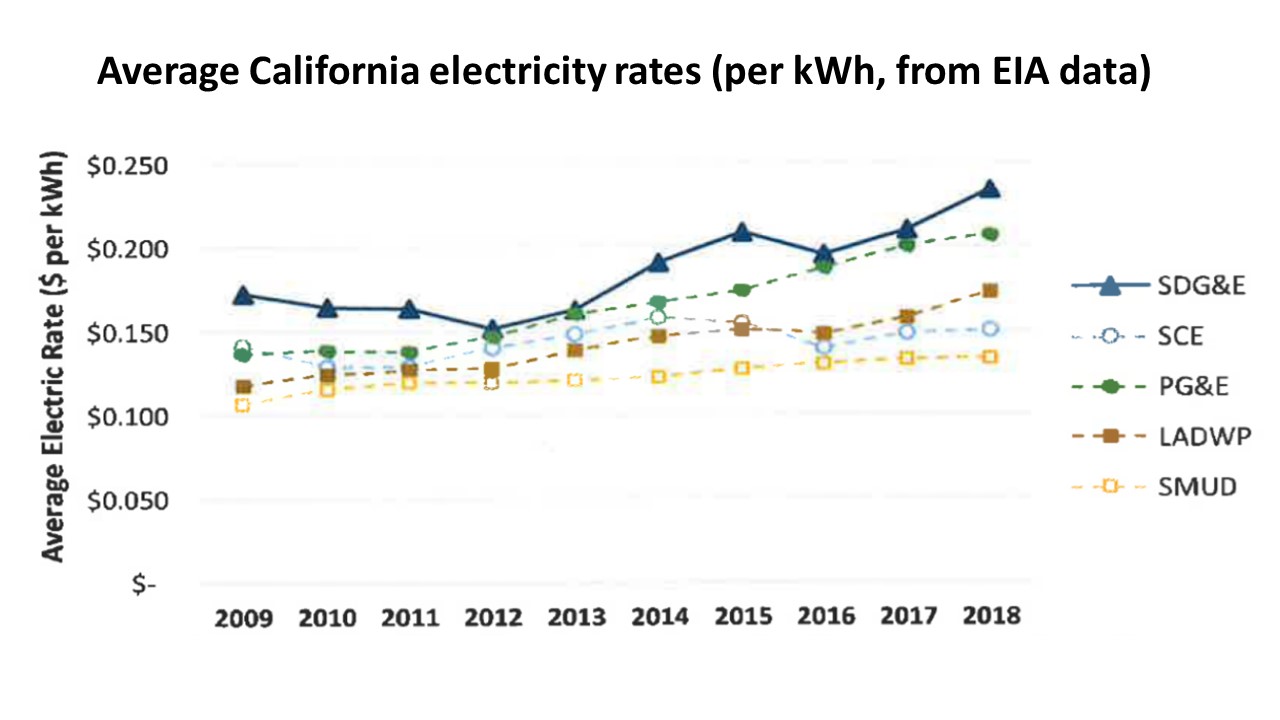Conflict among city leaders over San Diego's energy future has left potential bidders for rights to be the city's utility, including incumbent San Diego Gas and Electric (SDG&E) and Berkshire Hathaway Energy (BHE), wondering what to offer.
City Council disagreement over the services and relationship the city should get with its next provider has blocked approval of terms for new utility franchise agreements, which expire in January. Dissatisfaction with SDG&E, which charges California’s highest power rates, did not lead to agreement on an Invitation to Bid (ITB) that will define requirements for power providers seeking to take over service for the city.
Would-be bidders now await an ITB from outgoing Mayor Kevin Faulconer. As in many municipalities, it is the city charter-required duty of the mayor to oversee a franchise renewal, even without clear guidance from the council.
"We definitely have challenges with SDG&E, and we want to leverage the franchise discussions to find a partner that will help San Diego reach its renewables and climate goals and build a modern grid," said Erik Caldwell, the city's deputy chief operating officer. The ITB "will be designed to find a franchisee that understands where the utility industry is going and will commit to leading San Diego there."
Faulconer and most stakeholders support the city charter-required competivitive solicitation for new rights-of-way (ROWs) to deliver electricity and natural gas. Three bidders, SDG&E, BHE and Indian Energy, a small, local provider, officially expressed interest and await the mayor’s attempt to define a minimum bid and other required terms in the absence of council approval.
Two major questions threw the ITB design to the mayor. What should the city get from a franchisee for potential billion-dollar benefits? Or should San Diego choose the popular option to form a municipal utility like those in Los Angeles and Sacramento?
What will San Diego want?
Council members largely agreed on their dissatisfaction with SDG&E, over high rates and unsatisfactory service, but not on what should be required of the next franchisee. Their 5-4 rejection, on August 6, of ITB terms proposed by city consultant JVJ Pacific Consulting and endorsed by the council's Environment Committee July 16 means the mayor must issue an ITB with his best guess at what will get the required 2/3 council vote for approval of the solicitation's winner.
The major bidders are waiting for the ITB to comment in depth.
SDG&E "looks forward to presenting a bid to meet the city’s needs," the utility’s VP for State Governmental Affairs and External Affairs Mitch Mitchell told the council August 6.
"Changing technology and business models will make a long-term agreement deficient within 10 years."

Erik Caldwell
Deputy COO, San Diego
BHE wants "to align with the city’s goals" and "looks forward to learning what the city is most interested in," BHE Vice President for Government Relations Jonathan Weisgall told the Environment Committee. BHE has since avoided public comment and declined multiple interview requests.
Indian Energy has not commented and has been unavailable for interviews.
The JVJ proposal is expected to guide the Mayor’s ITB. The proposal included an unchanged 3% of revenues yearly franchise fee for electricity and increased the natural gas annual franchise fee from 3% to 3.5% of revenues. There is ratepayer relief through reduced bill surcharges. And JVJ proposed new transparency and accountability standards for the franchisee.
The most contention was over the proposed minimum initial bids of $54 million for the electricity franchise and $8 million for the natural gas franchise.
The next franchise holder will earn an estimated $6.4 billion over a 20 year agreement, JVJ’s Howard Golub, the former general counsel to California utility giant Pacific Gas and Electric, told the council. That makes the recommended minimum opening bid "slightly less than 1% of the value of the franchises."
Councilmember Monica Montgomery, demanding a 5% minimum bid, Councilmember Vivian Moreno, demanding a Climate Equity Fund for disadvantaged communities, and Councilmember Barbara Bry, calling for more deliberation, all rejected JVJ's plan.
Compromises from Council President Georgette Gómez and Environment Committee Chair Jennifer Campbell were rejected.
JVJ’s recommended 20-year franchise term produced passionate citizen input and contributed to the other three 'no' votes. Support for a term of 20 years or more came largely from SDG&E union employees. Many consumer, social equity and environmental advocates urged a 5-year agreement to test the winning bidder’s performance.
A 2020 National Renewable Energy Laboratory NREL survey of 3,538 municipalities found that "since 1995, most cities have adopted 20-year contracts," making a 20-year agreement "reasonable," JVJ reported.
"Changing technology and business models will make a long-term agreement deficient within 10 years," San Diego Deputy COO Caldwell said. "But we want a long enough agreement to attract investment."
SDG&E faces a number of challenges in any potential bid to renew its franchise agreement.
It has the highest rates of California’s large electric utilities and was "below average in customer satisfaction" among Western utilities in the industry-standard J. D. Power 2019 rankings, JVJ found. In addition, SDG&E’s parent Sempra opposed San Diego’s formation of a community choice aggregator, which the city strongly supported, JVJ added.
Complaints also continue about SDG&E’s costs and handling of ongoing infrastructure relocation and undergrounding, Climate Action Campaign Co-Director of Policy Matthew Vasilakis and Utility Consumers’ Action Network Executive Director Edward Lopez told Utility Dive. It has also not provided the transparency and accountability San Diego wants, both said.
The city wants "third party performance audits and a clear dispute resolution process," Caldwell said. And "SDG&E even at its best, has not supported the Climate Action Plan and the move to distributed generation that we want."
Equally troubling is that Sempra’s recent credit downgrades could also prevent the new investments city leaders want, watchdog Voice of San Diego reported in June.
In response to the financial concerns, SDG&E spokesperson Helen Gao said the utility has a "5-year, $8.9 billion capital plan for 2020-2024 that is not expected to require any new equity." In addition, SDG&E's credit ratings will allow debt funding, she said.
Lenders are willing to provide financing at lower credit ratings in this economy, according to Pace University Energy and Climate Center Institute for Energy Democracy Fellow and regulatory proceeding veteran Jim Lazar. "But SDG&E’s high rates and customer dissatisfaction are a threat to its financial strength," he added.
"An easy off-ramp to establishing a municipal utility doesn't mean it will happen, but the option makes the franchisee more accountable."

Bill Powers
Principal, Powers Engineering
SDG&E plans investments "to facilitate meaningful reductions in greenhouse gas emissions" through expansion of EV charging infrastructure, clean energy and energy storage, Gao said, in answer to the concerns about the utility's commitment to San Diego's climate plan.
She did not respond to questions about the "below average" customer satisfaction ranking and complaints about the undergrounding efforts and failure to be transparent and accountable.
SDG&E wants a 25-year franchise term, the utility’s Mitchell told the San Diego Union-Tribune in 2019. And JVJ was "unfair and inaccurate" in its assessment, he told the council’s environment committee. SDG&E‘s greater than 40% renewables capacity is ahead of California’s mandate, it is a major advocate for transportation electrification and energy storage, and it has been "exemplary" in wildfire prevention, Mitchell said.
A stakeholder coalition of ratepayer and environmental advocates wants a five-year agreement that defines how the city could take over SDG&E's infrastructure and operations, Powers Engineering Principal Bill Powers told Utility Dive. "An easy off-ramp to establishing a municipal utility doesn't mean it will happen, but the option makes the franchisee more accountable."
If San Diego does not get that accountability from SDG&E or another bidder, its charter allows forming a municipal utility like those in Los Angeles and Sacramento, JVJ, council members, Caldwell and others agreed.

Municipalization
Despite municipalization’s popularity in San Diego, the city should only take on its many potential complexities and costs if it does not complete a new franchise agreement, JVJ’s Golub told the council, citing the experience of Boulder, Colorado.
The Boulder City Council and its citizens approved municipalization in 2014. But Xcel Energy, the incumbent utility, blocked progress until, in July 2020, it reached a potential settlement on a 20-year franchise with 5-year reviews and strict conditions for the utility.
Under pressures from the economic downturn and the legal and regulatory costs to fight Xcel, Boulder negotiated a settlement providing "about 70% of what municipalization would," Boulder Mayor Sam Weaver said. It offers "real potential for collaboration between the city and the utility" if Boulder voters approve it in November.
"[B]eing lured into a 5-year agreement to make municipalization easier for the city would be my worry if I was a utility in San Diego."

Chris Hansen
State Senator, Colorado
Boulder's greatest obstacle was the purchase of Xcel’s infrastructure at a price determined through a public "condemnation" process which would likely have cost Boulder nearly $200 million, Weaver said.
Xcel and Boulder "found out the hard way that resolving these differences is tougher and more expensive than it looks," Colorado state Senator Chris Hansen, D, observed. But "being lured into a 5-year agreement to make municipalization easier for the city would be my worry if I was a utility in San Diego," he added. "Five years is not long for utility assets."
The city's other option is to let the franchise expire, Pace's Lazar said. "Start building a parallel system in densely populated and lucrative parts of the city, leaving the incumbent utility with the least valuable parts of the system. When it sees its assets becoming valueless, it will make a deal."
San Diego wants to "leverage" the coming franchise negotiations to get "fair compensation" for one of the biggest franchises in the state "and to understand the bidders’ vision of the future."
Boulder’s settlement came from "the threat of municipalization," Weaver acknowledged. "Xcel made it clear the only reason the agreement has some concessions is because they want to settle the legal dispute."
But Boulder discovered leverage required more than the threat of municipalization.

Leverage
Condemnation of SDG&E's system could lead to "financial burdens on taxpayers or ratepayers" because it requires the city to pay for and take on the operations and maintenance costs of the incumbent’s infrastructure, JVJ cautioned.
"Franchise renewal is leverage, but even cities with years left on their franchise agreements can start talking to their utilities ...The real leverage is the relationship."

Vicki Bennett
Sustainability Director, Salt Lake City
Addressing infrastructure ownership would introduce the long and costly legal and regulatory condemnation process Boulder has yet to resolve. Salt Lake City avoided those complexities in its 2015-2016 franchise renewal negotiation with the Buffett-owned Rocky Mountain Power (RMP), a subsidiary of BHE, and is now completing a 5-year agreement.
Like San Diego, Salt Lake City wanted to leverage the franchise negotiation with the municipalization threat. "Franchise renewal is leverage, but even cities with years left on their franchise agreements can start talking to their utilities," Salt Lake’s Sustainability Director Vicki Bennett said. "The real leverage is the relationship."
A franchise agreement is narrow, and policy provisions are subject to state regulators, Bennett said. Salt Lake City circumvented those limitations with a "cooperation statement" with RMP that was attached to the five-year franchise agreement.
"So far, RMP has worked with us and we will probably do another 5-year franchise, not because of a lack of trust, but because five years is now a long time," she said. The only "secret strategy" is getting past "the old adversarial role."
Any city negotiating with a utility should "tell them what you want, why, and be willing to work with them," she said. "The leverage is coming back to the table."
The Boulder-Xcel settlement came out of direct discussions between Xcel Colorado President Alice Jackson and Mayor Weaver and its success depends on city and utility teams meeting four times a year, Weaver said. If it succeeds, it will be a "partnership through process," and "if something is falling apart, we know who to go talk to."

Missed opportunities
Though the San Diego City Council did not reach agreement on all elements of a solicitation, "each council member has made clear what their priorities are," Caldwell said after the Aug. 6 meeting.
But there is risk for the mayor in moving forward without council assent on the elements of the ITB because the council has to approve the final franchise agreement, Powers said. Getting to six 'yes' votes "will not be easy politically and will require a rigorous public process."
Since the franchise was awarded to SDG&E 50 years ago, "the energy industry has changed," Deputy COO Caldwell said. "There was no renewable or distributed generation, no customer choice organizations, no resource adequacy concerns. In this franchise discussion, we want to revisit missed opportunities."
The release of the ITB will be "this month or next," he added in an Aug. 21 email.




















